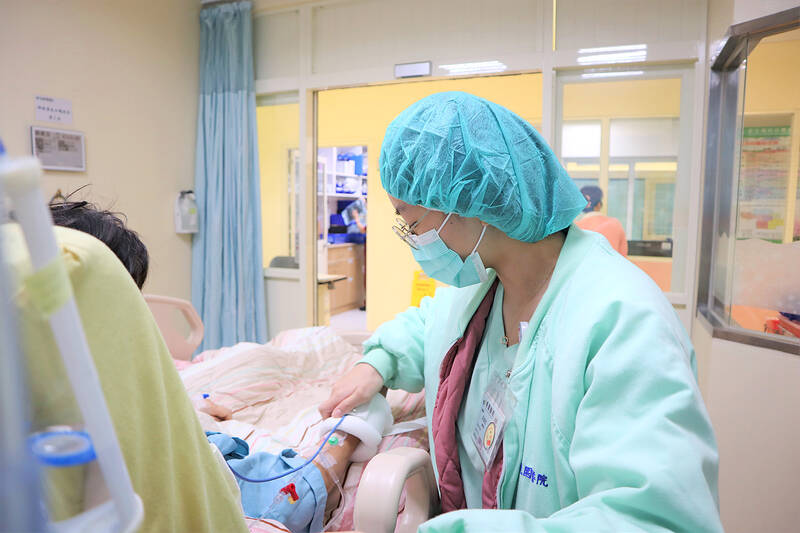The Ministry of Health and Welfare awarded a total of NT$547 million (US$18.6 million) to hospitals that have met the nurse-to-patient ratios set for the three-shift nursing system, amid a push to handle a nationwide shortage of healthcare workers.
The ministry in a news release said that 363 hospitals received money for achieving the preliminary targets of the government program to promote efficiency in nurse rotation systems used in urgent care.
Institutions that have met the requisite nurse-to-patient ratios in two or three shifts would respectively receive an amount equal to 3 percent or 7 percent of their income derived from hospitalization and care, it said.

Photo courtesy of Cheng ying-gui
This reward stemmed from Phase 1 of a program to reform the allocation of available nursing staff in hospitals’ urgent care departments, launched in March last year, the ministry said.
Phase 2, starting next month, would require hospitals to meet targets for all shifts to receive the reward, which is increased to 10 percent of the institution’s hospitalization and care-derived income, it said.
The ministry’s budget for Phase 2 reward money totaled NT$1 billion, it said, adding that hospitals would be assessed and awarded each quarter.
Linkou Chang Gung Memorial Hospital in Taoyuan, Kaohsiung Chang Gung Memorial Hospital, Taipei Veterans General Hospital, Tri-Service General Hospital in Taipei and Changhua Christian Hospital received the largest sums, it said.
These hospitals — granted rewards ranging from NT$40.54 million to NT$18.69 million — were all large medical centers targeted by the program as standard bearers for the rest of the healthcare sector, it said.
Twenty-seven medical institutions failed to meet Phase 1 standards and received no reward, the ministry said.
They include the ministry-run Taipei Hospital, Shuang Ho Hospital in Taipei, Tainan Hospital, Miaoli Hospital, Changhua Hospital and Feng Yuan Hospital in Taichung, it said.
They additionally include Yuan’s General Hospital in Kaohsiung, Saint Paul’s Hospital in Taoyuan and Asia University Hospital in Taichung, which are not run by the ministry, it said.
Hospitals received nurse-to-patient targets from the program depending on their rank in the three-tier health provider system of medical centers, regional hospitals and local hospitals, Department of Nursing and Healthcare Director Chen Ching-mei (陳青梅) said.
Taiwan boasts 20 medical centers, 80 regional hospitals and 300 local hospitals that provide urgent care, she added.
Regional hospitals face the worst of the nurse shortages, especially in night shift staff, Chen said, adding that a nurse-to-patient ratio of 1:11 and 1:13 was typical of early and late night shifts respectively.
Many regional hospitals could only reach the mandated staffing level target for one of their shifts, she said.
The money awarded to hospitals must be utilized on nurses and authorized, personnel-related purposes, such as retention programs, she said.
The ministry conducts spot inspections to ensure hospitals spend the funds in the manner specified, Chen added.
Taiwanese hospitals that met the program’s Phase 1 targets have increased from 50 percent in March last year to 60 percent in March, while the number of people working as nurses increased by 1,500, she said.

The manufacture of the remaining 28 M1A2T Abrams tanks Taiwan purchased from the US has recently been completed, and they are expected to be delivered within the next one to two months, a source said yesterday. The Ministry of National Defense is arranging cargo ships to transport the tanks to Taiwan as soon as possible, said the source, who is familiar with the matter. The estimated arrival time ranges from late this month to early next month, the source said. The 28 Abrams tanks make up the third and final batch of a total of 108 tanks, valued at about NT$40.5 billion

Two Taiwanese prosecutors were questioned by Chinese security personnel at their hotel during a trip to China’s Henan Province this month, the Mainland Affairs Council (MAC) said yesterday. The officers had personal information on the prosecutors, including “when they were assigned to their posts, their work locations and job titles,” MAC Deputy Minister and spokesman Liang Wen-chieh (梁文傑) said. On top of asking about their agencies and positions, the officers also questioned the prosecutors about the Cross-Strait Joint Crime-Fighting and Judicial Mutual Assistance Agreement, a pact that serves as the framework for Taiwan-China cooperation on combating crime and providing judicial assistance, Liang

A group from the Taiwanese Designers in Australia association yesterday represented Taiwan at the Midsumma Pride March in Melbourne. The march, held in the St. Kilda suburb, is the city’s largest LGBTQIA+ parade and the flagship event of the annual Midsumma Festival. It attracted more than 45,000 spectators who supported the 400 groups and 10,000 marchers that participated this year, the association said. Taiwanese Designers said they organized a team to march for Taiwan this year, joining politicians, government agencies, professionals and community organizations in showing support for LGBTQIA+ people and diverse communities. As the first country in Asia to legalize same-sex

MOTIVES QUESTIONED The PLA considers Xi’s policies toward Taiwan to be driven by personal considerations rather than military assessment, the Epoch Times reports Chinese President Xi Jinping’s (習近平) latest purge of the Chinese People’s Liberation Army (PLA) leadership might have been prompted by the military’s opposition to plans of invading Taiwan, the Epoch Times said. The Chinese military opposes waging war against Taiwan by a large consensus, putting it at odds with Xi’s vision, the Falun Gong-affiliated daily said in a report on Thursday, citing anonymous sources with insight into the PLA’s inner workings. The opposition is not the opinion of a few generals, but a widely shared view among the PLA cadre, the Epoch Times cited them as saying. “Chinese forces know full well that